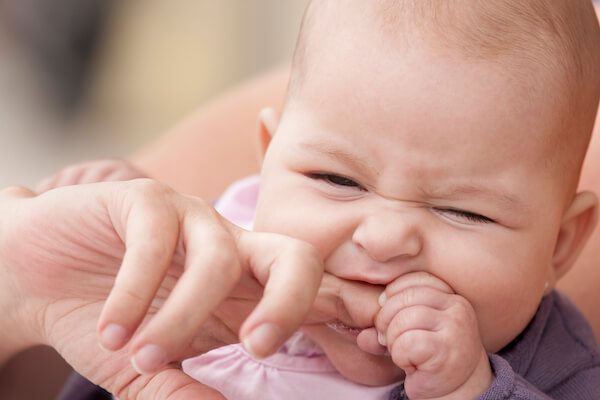Biting in Early Childhood

Child Development: Biting in Early Childhood
Biting in early childhood usually starts during teething, and is often a chance discovery. An infant may nip at their mother’s breast while feeding, or sink their teeth into their father’s shoulder during a cuddle. This kind of biting is often experimental, or may be motivated by teething pain.
Set the ground rules early by responding with a prompt, firm “NO!” the very first time your child bites. This sends a clear signal that biting is not acceptable.
One out of ten toddlers and two year-olds go through a biting stage. Young children bite for a variety of reasons:
- Experimenting with jaw movement
- For relief during teething
- Communicating frustration
- To regain control over a situation
Identifying the cause of biting may help parents avoid potential biting situations, and teach children more appropriate behaviours..
Biting in Early Childhood to Regain Control
Biting can occur when a child feels threatened or overwhelmed by their surroundings. Biting may provide your child with a powerful method of regaining control over a situation where they feel they are losing.
Some children feel the need for autonomy and control more than others. Make an extra effort to pay your child plenty of positive attention throughout the day, praising positive social behaviour such as sharing and taking turns.
This helps eliminate the need to resort to aggressive behaviour to feel a sense of personal power.
Biting in Early Childhood to Release Frustration
During the toddler stage biting can become a form of communication. Lacking the verbal skills to manage the desire for attention or another child’s toy, a frustrated toddler may resort to using their teeth to release pent-up feelings.
Toddlers are often shocked and upset by the reaction to their biting, as they don’t realise how much it hurts. Watch for signs of rising frustration in your toddler and distract or redirect them before they lose control.
As your child’s language skills develop, teach them appropriate language to express their needs, and praise them when they communicate effectively.
The Importance of a Consistent Response
Try to respond the same way every time your child bites another child. Explain simply and clearly:
“We do not bite – it hurts.”
Encourage your child to help make the other child (or adult) feel better – a cuddle, a tissue to dry their eyes, and a cold cloth or ice-pack can all be administered by your child (with your help).
If you have concerns about your child’s biting, we recommend you seek support from your early childhood Educator or your family doctor.
Delivering The Best in Early Learning
Every child deserves the best start in life. Get in touch today!
